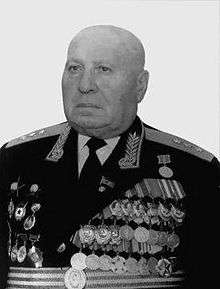Aleksi Inauri
| Aleksi Inauri | |
|---|---|
 | |
| Born |
29 April (12 May) 1908 Gori |
| Died | 23 June 1993 (aged 85) |
| Allegiance |
|
| Rank | Colonel General |
| Awards |
(34 in total) |
Aleksi Inauri (Georgian: ალექსი ინაური; Russian: Алексей Николаевич Инаури, Aleksey Nikolayevich Inauri) (April 29 or May 12, 1908 – June 23, 1993) was a Soviet Colonel General and Georgian commander who headed the Georgian KGB (Committee for State Security) for over 30 years (1954–1986) and made it one of the most effective of the KGB's regional Soviet branches.[1] He ended his career as a colonel general and a Hero of the Soviet Union.[2]
Early life and career
Born in Gori (then under the Russian Empire), Inauri was a worker until volunteering, in 1926, in the Red Army and graduated from a Cavalry School for the North Caucasian Mountainous Nationalities in Krasnodar in 1931. From April 1931, he commanded a cavalry platoon and then a squadron of the 16th Cavalry Regiment, 3rd Cavalry Division of the Ukrainian Military District. He became a member of the Communist Party of the Soviet Union in 1932. From October 1936, Inauri was put in charge of the regimental schools for the same division, later in 1938 as assistant commander for the commanding officer. Before the outbreak of war, Inauri commanded the same division's 99th Cavalry Regiment as a major in the Kiev Special Military District.[2]
World War II
From June 1941 to January 1942, Lieutenant Colonel Inauri led the 99th Cavalry Regiment into combat. The cavalrymen under his command excelled in mid-January 1942 during the Second Battle of Kharkov, which led to another promotion in May 6 of the same year. From August 1942 to the end of the war, Inauri commanded the 1st Cavalry Division of the 15th Cavalry Corps, Transcaucasus Front and had an essential role in the Battle of the Caucasus. Due to outstanding performance, Inauri was promoted to Major General by the resolution of the Council of People's Commissars of the USSR.[2]
Post war
Inauri continued service as a commander of a cavalry division till 1946. In 1948 he graduated from the Voroshilov General Staff Academy and took charge of the 18th Mechanized Infantry Division as part of the Soviet occupation forces in Germany. In 1951 he commanded the 9th Infantry Division and in February 1953 he took command over the 3rd Mountain Corps of the Carpatian Military District. In 1954, Inauri was made head of the Georgian KGB, a post that he retained until 1986. Later in 1957, he was promoted to Lieutenant General. His tenure coincided with a series of upheavals, including the 1956 uprising, and rise of anti-Soviet dissident groups in Georgia to which Inauri was able to respond vigorously due largely to a strict discipline imposed by him within the KGB and a large web of espionage through which Inauri's agents infiltrated dissident groups and even the Georgian Orthodox Church. He played a key role in a palace coup against Nikita Khrushchev in October 1964, escorting the Soviet leader from his datcha at Pitsunda to a special meeting of the Presidium of the Central Committee in Moscow where Khrushchev was to be ousted.[3] Inauri was promoted to the rank of Colonel-General in 1967 and awarded the title of the Hero of the Soviet Union in 1985, shortly before his retirement later in 1986.[4] From 1984 to 1989, Inauri was a member of the Supreme Soviet of the Soviet Union.[2]
References
- ↑ Cherkashin, Victor & Feifer, Gregory (2005), Spy Handler: Memoir of a KGB Officer, p. 125. Basic Books, ISBN 0-465-00968-9.
- 1 2 3 4 http://www.warheroes.ru/hero/hero.asp?Hero_id=8791
- ↑ (Russian) Инаури, Алексей Николаевич (Inauri, Aleksey Nokolayevich). warheroes.ru. Retrieved on 2008-06-14.
- ↑ Knight, Ami W. (1993), Beria: Stalin's First Lieutenant, pp. 214, 277. Princeton University Press, Princeton, New Jersey, ISBN 0-691-01093-5.